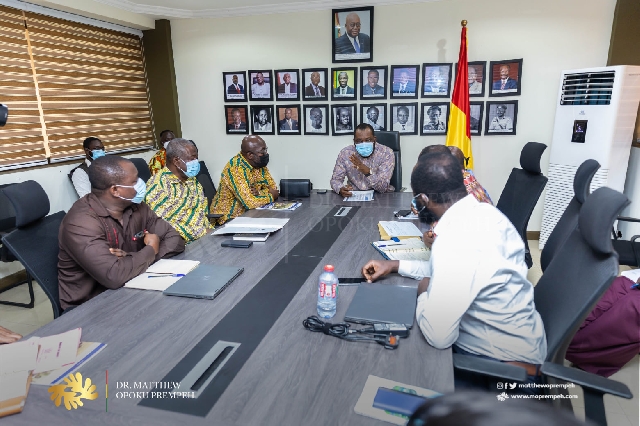Nuclear Power Ghana submits evaluation report to Energy Minister
A delegation from Nuclear Power Ghana (NPG) on Monday, 24 January 2022 submitted an evaluation report as part of processes leading to the selection of a vendor for Ghana’s Nuclear Power Project at the Ministry of Energy.
According to Energy Minister Dr. Mathew Opoku Prempeh who received the report, nuclear energy, considered as a clean power source will be added to Ghana’s energy mix to meet the country’s needed baseload energy in the near future.
He expressed confidence that Ghana will continue to make gains in that regard as a country.
Dr. Prempeh also used the opportunity to swear into office a member of the Board of Directors of Nuclear Power Ghana, who is also the CEO of the Bui Power Authority, Mr. Samuel Kofi Dzamesi.
He charged the Bui Power Authority and the NPG to continue to work collaboratively as Ghana strives to make positive strides in its nuclear power efforts.
According to experts, there are many opportunities in the nuclear energy sector for industrial development. These include workforce income impact, employment, economic growth and job creation.
The nuclear energy industry is an engine for job creation. It requires highly skilled labour and promotes economic growth. A 1000 Megawat nuclear power plant creates direct employment for 700 to 1,000 people during operation.
It is important to anchor the point that Nuclear Energy Institute Study in 2012 revealed that nuclear power plants create the largest workforce yearly income based on both large capacity and being a labour intensive technology. Aside this, nuclear power plant workforce is among one of highest paying jobs in established nuclear countries.
Apart from that, it estimated that craft labour requirements for 1000 Megawat unit is about 4140. A typical on site labour jobs include masons, pipefitters, carpenters, sheet metal workers, welders, millwrights electricians, iron workers, engineers, heavy equipment operators and insulators, projects managers and construction supervisors.
Government of Ghana set up Nuclear Power Ghana with the sole vision to be a regional leader in providing affordable, reliable and sustainable low-emission energy. In view of that, the mission is to build Ghana’s nuclear power plants aimed at producing affordable electricity in safe and environmentally friendly manner for socio-economic growth.
The agenda to propel these mission and vision is anchored on safety, accountabilty, transparency, teamwork and excellence.
Among the key organisations for Ghana’s nuclear power management project include Ministry of Energy, Ghana Nuclear Power Programme Organisation (GNPPO) incorporated into government agency to act as the national coordinator, Nuclear Power Ghana (NPG) to be Ghana’s first nuclear power plant owner/operator tasked with project development, Nuclear Regulatory Authority, Technical and Scientific Support Organisations (TSOs).
Nuclear Power Ghana in its operations has the duty to ensure the safety of people living in Ghana and the environment taking precedence over all other requirements whilst conducting activities with total openness. Apart from that, the NPG is responsible for its action, believes cooperation, put team above individual performance and a firm dedication to good quality and innovation.
Source: Jerry John Akornor






















































